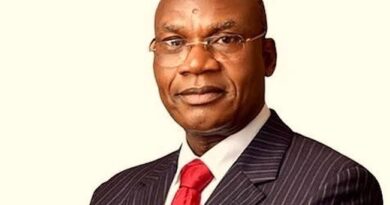INTERVIEW: Yunus Oyetunde: Championing Cybersecurity Innovation in Africa
INTERVIEW: Yunus Oyetunde: Championing Cybersecurity Innovation in Africa
Yunus Oyetunde, also known as Coy Emerald, is a 28-year-old tech guru from Offa in Kwara State, Nigeria. Renowned as the first Nigerian recognized by both Microsoft and Apple for his contributions to ethical hacking, Oyetunde’s journey into the world of technology and cybersecurity is as intriguing as it is inspiring.
In this exclusive interview with Intercontinental News 247’s ALABIDUN SHUAIB ABDULRAHMAN, Oyetunde provides insights into his background, his passion for ethical hacking, bug bounty hunting, and technical writing, shedding light on his mission to revolutionize cybersecurity education in Kwara, Nigeria, and Africa at large.
His remarkable achievements, including successful hacking attempts on major corporations like Apple, Google, and Microsoft, showcase his unwavering commitment to advancing cybersecurity not only in Africa but globally. Join us as we delve into the fascinating world of Yunus Oyetunde and uncover the pivotal role he plays in shaping the future of cybersecurity on the continent.
Can you tell us about your background and how you initially got interested in technology and cybersecurity?
My name is Yunus Oyetunde, I’m 28years old from Abugba’s Compound Offa, Kwara State. I got my name “Coy Emerald” from an Indonesian girlfriend (Zeayne Jye). I work offline as a Gsm Technician, meaning I also repair both phone’s software and hardware issues, and many people in Offa know me as Operamini.
My first passion was soccer. I love playing football but after I had an injury a week to one ileya festival, I decided to quit playing football and tried looking into something else that I also have interest in, that is doing technical research and findings. I have been a tech enthusiast since my secondary school days in Tawakalitu Grammar School, Offa, because I’m one of the most contacted person in ọ́ffa especially when people in the community have a technical issues with their mobile phone or difficulties while connecting to the internet.
READ ALSO: Inuwa Pledges Support for Women in Tech
What prompted you to pursue a career in ethical hacking, and how did you develop your expertise in this field?
Hmmm! Just like everyone else, bi ako rẹ ní gbé kèlé aotẹ́ra mọn iṣẹ ni. I got motivated and encouraged by one Mr John Harper (now late) after I came across technical issues on his website around 2015. I contacted him just to inform him. In fact, I wasn’t expecting a bounty as I had only decided to help him with my discovery and luckily, he put a phone call to me (it was my first time accepting an international call) after he sent me an email message to thank me for helping him, and he gifted me money.
Additionally, ethical hacking was a self discovery to me because during my secondary school time in T.G.S, I didn’t even have access to computers, so in reality, I learn (ethical) hacking by doing it.
For your information, the late John Harper was the owner of this website: https://jbhconsulting.co.uk.
Could you share some insights into your experience as a bug bounty hunter and technical writer? What motivates you to contribute to these areas?
Bug bounty hunting, the most interesting and frustrating career in ethical hacking has been an interesting journey because apart from the several bounties that I’ve received through it, it has also taught me patience (triage time, remediation time, and if the submission is eligible for bounty, sometimes it takes time to get a reward).
I’ve actually been a technical writer even before I fully focus on bug bounty hunting. If you go through my social media pages – Facebook, Twitter, LinkedIn, and even Medium, you’ll see that all my posts, including the older ones, have always been on technology. And it’s a fact that you cannot even be a successful bug bounty hunter without having the ability to write clearly about discovered vulnerabilities or bugs.
And I’ve chosen technical writing as my form of giving back to the infosec community (sadaqotu jariyah) because most times I write for free, and at least it’s helping the less technical people to learn more about cyber security and to help them stay safe and smart while using the internet.
As the CEO and instructor of O-range Ethical Hacking Class, what inspired you to start this initiative, and what impact do you hope it will have on cybersecurity education in Kwara and Nigeria?
First, after I discovered myself that I have the ability to teach and train others, and as it’s said by the noble prophet, “khairunaa (kum) mon tahalamal qur’ian, wa allamahu,” I decided to have a physical centre to share my knowledge of cyber security and ethical hacking with whoever is interested in learning it and I have also established this training to practically train people in Kwara and Nigeria at large on the alternative and legal means of making money through the internet without abusing the use of it.
You’ve been recognized by major companies like Apple, Google, and Microsoft for your cybersecurity contributions. Can you walk us through your journey of gaining recognition on such a global scale?
I just woke up one day in 2022 and felt like I should try my hacking ability to see if it’s possible to ethically hack these popular big companies – Apple, Google, Microsoft, and Facebook, and because I felt I could, I attempted and was able to do it.
And in this year 2024, I made 5 hacking attempts on Apple Server, and the 4/5 attempts were successful, and until today, this afternoon, Sunday, March 10, 2024, the Apple product security team is still in touch with me as I’m still assisting them in resolving my reported issues with them.
I made similar hacking attempts on Google and Microsoft, and they were successful too. I honestly felt happy to be the first Nigerian recognised by Microsoft and Apple.
How do you balance your roles as an educator, bug bounty hunter, and technical writer? What challenges have you faced, and how have you overcome them?
It has not been too easy for me to remain in this field but it has also not been too difficult for me to have any reason to give up. But honestly, it was only tough when I first started about 10 years ago, but now, it’s not. Just like a Yoruba adage says, “Bi Obìnrin bá pê ní ilé ọkọ, yìí o di ajẹ́. I can boldly say I’m a wizard in the field now.
Having said this, this doesn’t mean I’ve not experienced any challenges, so I have encountered lots of challenges too. In fact, I’ve once been invited by law enforcement officers to their headquarters in Ilorin. But the greatest challenges that I’ve had so far have been from those who have zero knowledge of what ethical hacking is because there are still lots of people, especially Nigerians, who don’t believe there’s anything ethical in hacking.
In what ways do you see yourself contributing to the advancement of cybersecurity in Africa, and what are your long-term goals in this regard?
As an ethical trainer, I have trained over 20,000 people, both Nigerians and non-Nigerians, on the ethical things to do with the internet, and I have also helped several companies and institutions in Nigeria and abroad by providing voluntary and paid ethical hacking services to them. So, I hope to extend this and beyond my country, i.e., Nigeria. I hope that my cyber security/ethical hacking training centre, O-range, will be the No. 1 perfect place to learn about ethical hacking and cyber security in Africa and even in the whole world.
Can you share a memorable experience from your journey as a cybersecurity expert that has shaped your approach to your work or your outlook on the industry?
Yes, it was during last year, 2023, when the National Information Technology Development Agency (NITDA) collaborated with me to share my cyber security and ethical hacking knowledge with Nigerians by training Kwarans for five days on cyber security and ethical hacking.
As someone who has garnered a significant following on social media, how do you leverage this platform to spread cybersecurity awareness and share your expertise with others?
Since a long time ago, I have been using my social media pages both Facebook and Twitter to share important cyber security tips and helpful technical updates via statuses.
Looking ahead, what do you envision for the future of cybersecurity in Nigeria and Africa, and how do you see yourself playing a role in shaping it?
Of course, the future of technology in Nigeria is great and amazing because every day a lot of Nigerians are now exposed to the ethical parts of the Internet. In fact, the number of cyber security enthusiasts has increased and as one of the top contributors to the safety of Nigeria’s infrastructure and also as a tutor, I will keep on providing quality ethical hacking and cyber security training and services to support the Nigerians visions and missions.




